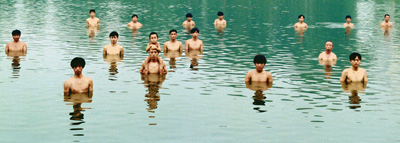Self conscious?
Judith Knight considers the ethics and practicalities of international touring in an era of ecological disasters

I’m not sure we are living in an ecologically conscious age. Despite recent mudslides and floods in China and Brazil, flooding in Poland, drought in Africa and Russia and devastation in Pakistan, climate change remains mysteriously off the agenda. After Copenhagen and ‘climate-gate’, apparently fewer people believe that climate change is man-made, and there seems to be a frightening backlash against ‘greens’, in responses to blogs and news pieces. So, how do the arts respond to this? How do we keep working internationally in this context? Should we be working internationally? Is it ethical to fly our large performing companies back and forwards across the world (mostly for the benefit of wealthy, Western audiences) when the effects of these flights are felt in Pakistan, China and Bangladesh? Is it necessary to move the London Symphony Orchestra to New York and bring the New York Philharmonic to London, each with different interpretations of Mahler’s fifth symphony?
We all know the value of the arts. We’re especially conscious of this at a time of catastrophic funding cuts. We’re all aware of the importance of cultural exchange. And if people are to fly round the world, we would probably like them to be artists. Should we then only tour work that encourages political and cultural understanding – for example, plays from the Market Theatre of Johannesburg which gave us a real understanding of life under apartheid South Africa? Or the works of avant-garde artists such as Robert Wilson, The Wooster Group or Pina Bausch, which have been such an influence and inspiration? Could we imagine having to make choices about what art should tour and what shouldn’t?
SEISMIC SHIFTS
When Artsadmin began in 1979, the UK was much more culturally isolated. The shift over the years has been extraordinary, with international programming by venues and festivals up and down the country growing, and UK companies touring all over the world. In the 1980s, international touring became a symbol of success. Our projects, previously confined to small UK venues, started to play to large audiences at European festivals. Professional recognition, higher fees, and company meals in Italian piazzas – what was not to like? Now cheaper flights allow us to go wherever we are invited – for however short a time.
NEW WAYS OF WORKING
Over the past few years, inspired by TippingPoint, and guided by Julie’s Bicycle, Artsadmin has been looking at more sustainable ways of working internationally. Last year we held a conference with the British Council, ‘Slow Boat’, to discuss the issue with touring theatre and dance companies. Many ideas were put forward: finding new ways to make work; sourcing sets locally rather than shipping; making use of green technology; cultivating an understanding that creativity is not necessarily about making things bigger; travelling by train rather than plane; using local performers and technicians; programming geographically proximate tours with longer stays, maximising the benefit from each trip; working collaboratively to present work; dropping ‘exclusion clauses’ in contracts; producers and presenters sharing a commitment to a green agenda; collaborating on schedules for festivals and events; keeping productions in repertoire longer.
Since then, Julie’s Bicycle has continued its research on touring and measuring the carbon footprints of artists. We now have the means to understand the impact of our touring, and need to begin to act on that understanding, despite the many obstacles. There are already examples: Jerome Bel’s model of ‘sending the score’ but not the performers; Dries Verhoeven’s Life Streaming, a skype conversation between audience members in Europe and performers in Sri Lanka; Anna Teresa de Keersmaeker’s company Rosas performing only in natural light. Artsadmin is taking small steps. We have a Silver Green Tourism Award for our Toynbee Studios building. We’re working on a number of projects including our Two Degrees festival and a major art commission with LIFT as part of our work with the 2020 European Network producing projects on the subject of climate change. Last year we commissioned Richard DeDomenici’s Plane Food Café, made in response to Marcus Waring’s comment that pub food was so bad people would be better having lunch on a plane. Audiences were invited into a recycled aeroplane interior to enjoy real airline food on the ground. We’ve been trying to tour this in a sustainable way; using local performers and technicians, travelling by train rather than air, sourcing props locally. It’s not a zero carbon production but it’s a step in the right direction.
We certainly don’t have all the answers, but we do know two things: we must maintain international cultural exchange, and we must respond to the challenge of climate change. We have to find ways to work more collaboratively, less competitively and – somehow – more sustainably. All this in a time of funding cuts and uncertainty about the future. Interesting times.
Join the Discussion
You must be logged in to post a comment.